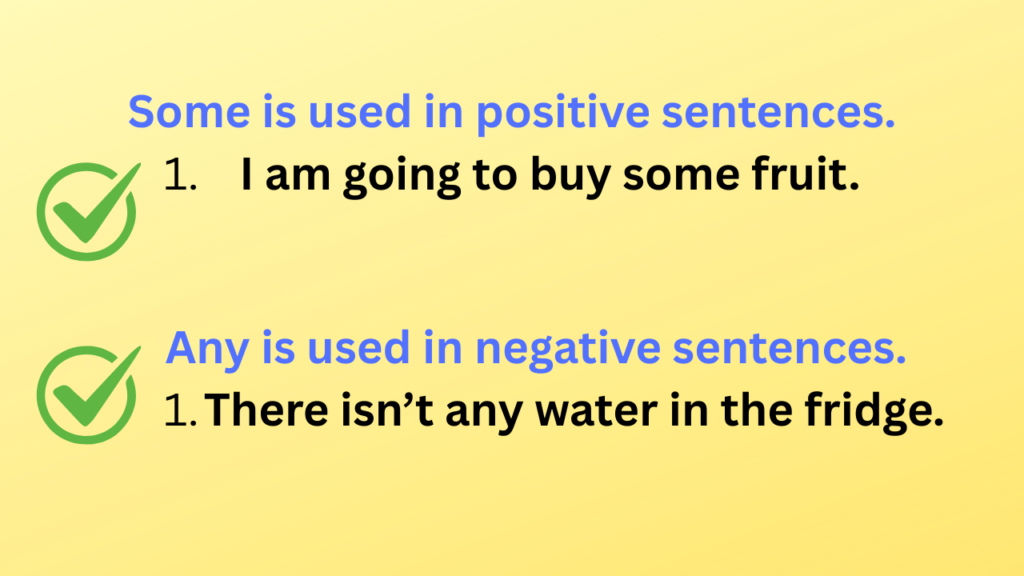In this article, we have explained the differences between some and any. We have explained how some and any can be used in different way. In the end there is an exercise for the students to solve.
Some refer to a limited but unspecified amount. It reflects the expectation of something available.
Any refers to something generally, where it doesn’t matter which or how much.
Use of Some
Example: I have got some books.
Some is used in positive sentences.
- I am going to buy some fruit.
- There is some butter in the fridge.
- We did some exercise.
Use of Any
Example: I haven’t got any magazines.
Any is used in negative sentences.
There isn’t any water in the fridge.
We didn’t do any exercises.

Use of any and some in questions: –
- Is there any fruit in the kitchen?
- Has she got any questions?
- Why did you buy any flowers?
We use some when we offer things.
- Can I have some salt, please?
- Would you like something to drink?
- Have you got some cheese?
- Can you lend me some money?
- Can I have some water please?
We often use any after if:
- If there are any questions for me, do let me know?
- If there is any paper on the table, can you give it to John?
Use of some and any without a noun.
- I didn’t borrow any books but Priya borrowed some.
- You can have some sandwich but I don’t want any.
- I have made some tea. Would you like some?
- Where are your books? I haven’t got any.
- ‘Are there any toys?’ ‘Yes there are some on the table.’

We use any with the meaning ‘it doesn’t matter which’:
- You can catch any train. They all go to Delhi.
- ‘Which dress shall I buy?’ ‘Any dress.’
- Come and see me anytime you want.
- ‘Where shall we go out for dinner?’ ‘Anywhere, I don’t mind.’
- Sita is an introvert girl. She never tells anyone about her problems.
Exercise (Some and Any)
Fill in the blanks with some and any: –
- I am going to buy _____ books.
- He didn’t make _____ mistakes.
- Have you got _____ pen or pencils?
- Is there ______ chocolate for me?
- There aren’t ______ pens in my bag.
- I have got _____ toys for your son.
- She always takes ______ sugar with her tea.
- There are _____ oranges in the kitchen.
- There is _____ food in the refrigerator.
- Ram needs to do _______ homework.
- John seldom eats ______ vegetables.
- The shopkeeper doesn’t have _____ umbrellas to sell.
- There isn’t ______ water in the jug.
- The cat is thirsty. Give it ______ water.
- Meera doesn’t need _____ advice.
- There wasn’t ______ accident on this road.
- Paul has bought ______ new chairs.
- ‘Would you like ______ coffee?’ ‘Yes please.’
Answers:-
- Some
- Any
- Any
- Some
- Any
- Some
- Some
- Some
- Some
- Some
- Any
- Any
- Any
- Some
- Any
- Any
- Some
- some
Overall, this is the difference between some and any in English Grammar. It helps students understand the use of ‘some’ and ‘any’ in questions, as well as their use with and without a noun. It contains an exercise for students to practice the use of some and any.
Frequently Asked Questions
I can’t find any of my pencils.
Do you have any letters for me?
I am not wearing any of those ties.
There isn’t any sugar.
They don’t have any children.
In English Grammar, some is used for affirmative sentences and positive sentences.
Any is used for questions and negative sentences. Countable plural nouns or uncountable nouns can use some and any.
Any is used in questions, negative sentences, and conditional clauses. It can be used as a pronoun when the noun is understood from the term. It can even be used to refer to comparative structures. It is also used in affirmatives in English grammar.
Conditionals: If you have any book, let me know.
As a pronoun: He didn’t eat any of those apples.
As an adverb: I can’t write any faster.
When you say ‘Is there some milk?’, you expect there might be milk. It is used as a request. However, when you say, ‘Is there any milk?’ then you are not sure if milk is there. Hence, it has a negative connotation.
We use someone when we are specific but referring to an unknown person. Whereas, anyone includes no person. Someone is used for positive sentences, but anyone is used for negative sentences. Someone is used for offers and requests whereas anyone is used for questions.
Also Read:-
- Use of It in English Grammar: Sentences and Examples
- Use of Enough in Grammar with 40 Example Sentences
- Complex Sentence Examples for Easy Grammar Learning
- Determiners Worksheet with Answers PDF | Easy Exercises | Free Download
- Uses of Modals for Class 5 | May, Might, Can, Could, Should & More with Examples

Written by Sukhjit Kaur, English educator with 17+ years of experience helping students master grammar and writing. Through EnglishVedas.com, she simplifies English grammar using examples from daily life and classrooms.
